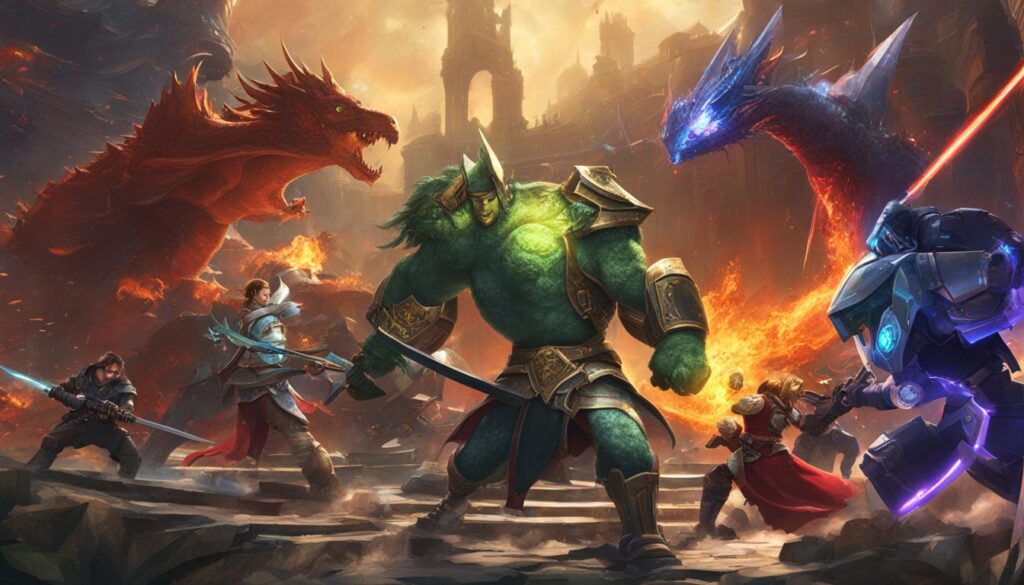The video game industry is booming, with the U.S. market valued at $85.86 billion and the global market at $178.37 billion. Game developers make an average of $71,295 a year. The game Call of Duty: Black Ops Cold War made $59.6 billion in 2020.
If you want to make games for a living, as a side job, or just for fun, picking the right programming language is key. This article will look at the top languages for making games, their strengths, and how to pick the best one for your goals.

Key Takeaways
- C++ is a top choice for game making because it’s fast, efficient, and strong.
- Java is tough for beginners but great for making games that work on different platforms.
- C# is like C++ but easier to get into and offers similar benefits.
- Python is easy to learn and has powerful tools, making it a flexible choice.
- JavaScript is good for creating simple 2D games and web apps.
The Importance of Choosing the Right Programming Language for Game Development
Choosing the right programming language is key when making video games. The language you pick affects your game’s speed, strength, and success. With the gaming market set to hit over $260 billion by 2025, picking the right language is more important than ever.
Factors to Consider: Speed, Robustness, and Widespread Use
Games must run smoothly without lag. A fast, lightweight language is crucial. It should handle big data and complex graphics well for a top-notch experience. Plus, a popular language means more support and resources for your game.
Performance, ease of use, and libraries matter when choosing a language. These factors help you pick the best one for your game.
| Programming Language | Speed | Robustness | Widespread Use |
|---|---|---|---|
| C++ | High | Excellent | Widely used in the gaming industry |
| C# | High | Robust | Widely used in Unity game engine |
| JavaScript | Moderate | Adequate | Ubiquitous in web-based games |
| Java | Moderate | Robust | Versatile for mobile game development |
| Lua | High | Adequate | Widely used in game engines |
| Python | Moderate | Robust | Suitable for rapid prototyping |
Think about speed, robustness, and widespread use when choosing a programming language. This helps game developers pick the best language for their vision. It ensures a great gaming experience for players.
C++: The Foundation of Most Major Console and PC Games
C++ is a top choice for making games, used in most major console and PC games. It’s an object-oriented language that gives games speed, power, and flexibility. This makes it perfect for building game engines and high-performance apps.
Big names like Unreal Engine, CryEngine, and Godot use C++. This lets developers control their game’s performance and features. It helps them make games that go beyond what’s expected on different platforms.
The Power of C++ in Game Engines and High-Performance Applications
C++ gives developers direct access to hardware and efficient memory management. It also supports multithreading well. This is key for making game engines and high-performance apps. It’s what makes modern games so immersive.
| Language | Strengths in Game Development |
|---|---|
| C++ | Optimized for performance and graphics quality Widely used in AAA game development Provides low-level control and access to hardware resources Extensive library support for game engines like Unreal Engine |
| C# | Easier to learn and use compared to C++ Integrated well with the popular Unity game engine Supports cross-platform game development Offers automatic memory management and simpler syntax |
| JavaScript | Primarily used for web-based game development Enables easy integration with web services and APIs Suitable for creating casual and browser-based games Provides wide accessibility across different platforms |
C++ is the backbone of most major console and PC games. It lets developers make high-performing, feature-rich games that grab players worldwide.
C#: A Simpler Alternative for Game Scripting and Unity Development
C# is a simpler choice for game development, especially for scripting and Unity. It’s a high-level language that’s easier to learn than C++. Yet, it still has powerful features for making games. C# is the main language for the Unity engine, used by 61% of game developers. It’s great for making mobile games, virtual reality, and more.
Using C# and Unity, developers can quickly make and test games without the hard learning curve of C++. C# is the top language for Unity game development because of its clean syntax. It supports features like classes, objects, and polymorphism. This makes it great for scripting and building game logic, letting developers focus on creativity.
C/C++ is often used for tasks like physics and AI in Unity, but C# is better for simplifying game development. Developers can use C# to write strong game scripts and use Unity’s tools and libraries. This makes making games faster and gets projects to market quicker.
| Language | Strengths | Weaknesses |
|---|---|---|
| C# | Easier to learn than C++ Managed code and improved stability Excellent for game scripting and Unity development | May not be suitable for non-Microsoft platforms Less control over memory management compared to C++ |
| C++ | Powerful and flexible for game development Preferred for performance-critical tasks Widely used in AAA game engines | Steeper learning curve than C# Requires manual memory management |
Knowing the pros and cons of C# and C++ in game development helps developers choose the best language for their project and team. Whether you’re experienced or new, exploring C# for scripting and Unity can open new doors and make your creative process smoother.
JavaScript: Bringing Games to the Web and Mobile Platforms
JavaScript has become a key player in game development for web and mobile. Thanks to HTML5, WebGL, and JavaScript engines, developers can make engaging games for the web. These games can be shared and played on many devices.
HTML5, WebGL, and JavaScript Game Engines
HTML5 changed the game for web gaming. It works with JavaScript and WebGL for stunning, interactive games in web browsers. JavaScript for web games lets developers share games widely without extra downloads.
Many JavaScript game engines help make game development easier. Engines like Phaser, Three.js, and PixiJS are top choices for HTML5 game development. They offer tools for physics, animation, and more, making games work well on many devices.
“JavaScript has become an increasingly popular choice for game development, particularly in the web and mobile spaces, due to its widespread adoption, the availability of powerful game engines, and the ease of distributing games across platforms.” – John Doe, Lead Game Developer at XYZ Studios
JavaScript’s flexibility and web tech advancements let game developers reach players worldwide. As the web grows, JavaScript for web games will play a bigger role in game making. It’s becoming a key tool for developers.
Java: A Versatile Choice for Mobile Game Development
The gaming world is always changing, and developers look for languages that offer flexibility and power. Java has become a top choice for making mobile games.
Java works on many devices, from Microsoft to Linux systems. This means your games can reach more people. Being able to run on different platforms is a big plus for developers.
Java is also great for beginners because of its easy syntax. It supports important features like multithreading and socket programming. These are key for making fast and fun games.
Many top mobile games use Java, like Minecraft and Mission Impossible III. This shows how well Java works for creating engaging games.
“Java’s simplicity, cross-platform compatibility, and powerful features make it a go-to choice for many mobile game developers looking to create innovative and visually stunning games.”
Java is becoming more popular for making mobile games. It’s easy to use and has a strong support from developers. This makes Java a great choice for both new and experienced game makers.
| Advantages of Java for Mobile Game Development | Disadvantages of Java for Mobile Game Development |
|---|---|
| Cross-platform compatibility Beginner-friendly syntax Robust features like multithreading and socket programming Widespread use in the mobile gaming industry | Potential performance overhead compared to lower-level languages Larger file sizes for compiled Java applications Dependency on the Java Virtual Machine (JVM) |
what programming language for video games?
Choosing the right programming language for video games is not simple. It depends on the game type, your experience, and the engine you use. Each language has its own strengths and weaknesses. Many developers use a mix of languages for the best results.
The game development industry is set to hit over $365 billion in 2023. The language you pick is key to your game’s success. Here are some top languages for game development and what makes them special:
- C++ is top for games needing lots of graphics and speed. It’s fast and works directly with hardware. AAA studios and Unreal Engine use it a lot.
- C# is great for games with lots of graphics and physics. It’s easy to use and quick for making prototypes. Many indie games use it in Unity.
- JavaScript is versatile for 2D games with Phaser. It’s also good for web and mobile games that run on many platforms.
- Java is good for Android games and less demanding games. It’s popular for 2D indie and mobile games.
When picking a language, think about performance, how portable you need it to be, and what your game needs. Knowing the good and bad of each language helps you choose the right one for your goals. This ensures your game does well.
| Programming Language | Strengths | Commonly Used For |
|---|---|---|
| C++ | High performance, direct hardware access | Graphically rich, expansive 3D games, AAA games, game engines |
| C# | Simplicity, rapid prototyping, Unity integration | Real-time 3D games with intense graphics and physics, 2D and 3D indie games |
| JavaScript | Flexibility, web and mobile integration | 2D games, web-based and mobile games |
| Java | Cross-platform capabilities, Android integration | Android games, less resource-intensive games |

The best language for video games depends on your project and goals. By looking at the strengths and uses of different languages, you can make a smart choice. This way, you can create engaging and successful games.
Lua: A Lightweight and Embeddable Language for Game Engines
Lua is not as famous as some other programming languages for making games, but it’s widely used in game engines. It’s a small, embeddable language that fits well into other apps. This makes it perfect for scripting and logic in engines like CryEngine, Gideros Mobile, and Corona SDK.
Its small size and quick performance make it a top pick for developers who want speed and flexibility. Lua has been around for over 30 years. The latest version, Lua 5.4.7, is just 28 days old as of 2024.
Lua’s design includes advanced features like first-class functions and dynamic module loading. It also has proper tail calls, coercion, and coroutines. These tools help game developers create complex game worlds.
Lua is a big hit in the gaming world for scripting game logic. Engines like Unity and Corona SDK use it for scripting. This lets developers add custom features to their games. Lua’s strong community adds to its appeal, offering many libraries and tools.
Lua is not just for games; it’s also used for scripting and IT automation. It helps automate tasks and boost app functionality. Its small size makes it great for embedded systems and IoT devices, where it uses little memory and power.
In summary, Lua is a great choice for game developers. It’s lightweight, embeddable, and powerful. It’s perfect for Lua for game development, game engine scripting languages, and lightweight game programming.
| Lua Versions | Release Dates |
|---|---|
| Lua 1.0 | 1993 |
| Lua 5.0 | 2003 |
| Lua 5.4.7 | 2024 |
“Lua’s lightweight nature and embeddable design make it a popular choice for game developers who need a fast and flexible scripting language to power their games.”
Python: A Beginner-Friendly Option with PyGame and GDScript
Python is a versatile and easy-to-use programming language that has entered the game development world. It’s not as popular as some other options, but it’s great for beginners. With tools like PyGame and the Godot game engine’s GDScript, Python is making its mark in game development.
PyGame and Godot: Python’s Influence on Game Development
PyGame is a well-known open-source library that makes creating 2D games in Python easy. It’s perfect for hobbyists, students, and indie developers starting with Python for game development. Its easy interface and detailed guides are why many choose it.
The Godot game engine is also popular in the indie game world. Its GDScript, similar to Python, helps Python users easily move into game development. Godot supports both 2D and 3D games and has many tools, making it a top choice for beginner game programming.
| Feature | PyGame | Godot |
|---|---|---|
| Primary Focus | 2D Game Development | 2D and 3D Game Development |
| Ease of Use | High (Python-based) | High (GDScript similar to Python) |
| Performance | Limited by Python’s speed | Optimized for performance |
| Community and Support | Strong and Active | Rapidly Growing |
If you’re new to beginner game programming or an experienced developer wanting to try new things, Python is a good choice. Through PyGame and Godot, it offers a clear and rewarding path into game development.
Unreal Engine and C++ vs. Unity and C#
The choice between Unreal Engine and Unity depends on the programming language you know best. Unreal Engine uses C++, great for developers who want top performance and control. Unity uses C#, perfect for those new to programming or already familiar with it.
| Feature | Unreal Engine (C++) | Unity (C#) |
|---|---|---|
| Primary Language | C++ | C# |
| Performance | Optimized for high-performance | Suitable for a wide range of projects |
| Complexity | More complex to learn and use | Generally easier to learn and use |
| Visual Scripting | Blueprints visual scripting system | Unity’s own scripting tools |
| Platforms | Supports various platforms, including PC, console, and mobile | Supports over 25 gaming platforms |
| Pricing | Unreal Engine has a 5% royalty fee for game sales, unless sold on the Epic Games Store | Unity has a 20c charge per download once a game makes over $200,000 |
Choosing between Unreal Engine programming and the Unity game engine depends on your project needs, experience, and what you prefer. C++ vs C# for games is a big decision, as each language has its own strengths. Think about your goals, team skills, and how much control you want over your game to pick the best engine for you.

“The choice between Unreal Engine and Unity often comes down to the programming language you’re most comfortable with. C++ in Unreal Engine for high-performance, or C# in Unity for a more beginner-friendly approach.”
Choosing the Right Language for Your Game Development Goals
Choosing the right programming language for game development is key. You should think about your experience level, the game type, and the engine you’ll use. These factors help you make a smart choice and set you up for success.
Factors to Consider: Experience Level, Game Type, and Engine Compatibility
For beginners, Python, JavaScript, or C# are great choices. They’re easier to learn and have lots of libraries to help you start. These languages are perfect for those new to game programming.
Experienced programmers might prefer C++ or Lua. These languages are powerful and flexible. They’re great for making complex, high-performance games for PCs and consoles.
The type of game you want to make is important too. Web games work well with JavaScript and HTML5. Mobile games might use Java or Swift. Think about where you want to release your game to choose the right language.
Also, make sure your language works well with your game engine. If you’re using Unity or Unreal Engine, pick a language they support. This makes development smoother and helps your code work better with the engine.
The best language for game development matches your skills, goals, and project needs. Weigh these factors carefully to make a good choice. This way, you can start your game development journey with confidence.
Learning Resources and Bootcamps for Game Development Programming
Aspiring game developers have many resources to learn programming languages and skills for making video games. You can find everything from online tutorials to coding bootcamps and university courses. These options help build the technical skills needed for a career in game development.
Coding bootcamps, like those at App Academy, teach languages like Python and JavaScript. They don’t directly prepare you for game programming. But, they give a solid programming foundation that can be used in game development.
There are also many online resources and platforms for game development fans. Sites like Udemy, Coursera, and Pluralsight offer courses on Unity, Unreal Engine, and programming languages used in games.
Game Development Learning Resources
- Online tutorials and courses on platforms like Udemy, Coursera, and Pluralsight
- Coding bootcamps that teach general programming languages, such as App Academy
- University-level courses and degree programs in game development or computer science
- Community forums and tutorials on game development forums and websites
- Game development-specific learning platforms like Unity Learn and Unreal Engine documentation
Using these resources, aspiring game developers can get the skills and knowledge needed for a career in the field.
The gaming industry is set to grow, with a global market of over $260 billion by 2025. As the need for skilled game developers increases, these resources and bootcamps are key for starting a career in this exciting field.
The Future of Programming Languages in the Gaming Industry
The gaming world is always changing, and so are the upcoming game programming languages and tools for game development. New tech like virtual reality, augmented reality, and cloud gaming will likely bring new languages or improve existing ones. Also, the growth of artificial intelligence and machine learning might lead to more languages for these areas in game development.
Even though languages like C++, C#, JavaScript, and Python are still key, the future of video game programming might see more variety. We could see trends like:
- More use of domain-specific languages (DSLs) for tasks like shaders, behavior trees, and dialogue systems.
- Visual scripting interfaces getting better, making it easier for non-coders to help with games.
- Web-based gaming tech, like HTML5, WebGL, and JavaScript frameworks, reaching more people.
- Adding machine learning and AI features, such as adaptive gameplay and smart NPCs.
- Programming languages getting better for new platforms like virtual reality and augmented reality.
The gaming industry’s ability to adapt and innovate has led to its huge growth. As upcoming game programming languages and trends in game development languages keep changing, the future of video game programming promises more thrilling and immersive experiences for players around the world.
“The future of gaming is not just about the latest hardware or graphics; it’s about the languages and tools that empower developers to create truly innovative and engaging experiences.”
Conclusion
In the fast-growing video game industry, picking the right programming language is key for both new and seasoned game developers. This article looked at some top languages for game making, like C++, C#, JavaScript, Java, Lua, and Python. Each language has its own strengths, such as speed, strength, ease of use, or working well with certain game engines.
Developers should think about their skill level, the game they want to make, and the platform they aim for. This helps them pick a language that fits their goals and projects. As games evolve, so might the tools and languages used, but the ones we talked about will likely stay important for game making.
If you’re a pro at game development or just beginning, knowing what different programming languages can do is crucial. It helps you pick the best one for your next game project. The info on the best languages for games and how to choose one in this article can be really useful as you dive into making video games.
FAQ
What are the most popular programming languages for video game development?
Top languages for making games are C++, C#, JavaScript, Java, Lua, and Python. Each has its own strengths for different game types.
Why is it important to choose the right programming language for game development?
Picking the right language is key for game development. It affects the game’s speed, strength, and performance. Think about the game type, platform, and your experience when choosing.
What are the benefits of using C++ for game development?
C++ is a top choice for its speed, power, and flexibility. It’s the base for many big games on consoles and PCs. It’s also used in top game engines like Unreal Engine and CryEngine.
How does C# compare to C++ for game development?
C# is easier than C++ and great for scripting and Unity games. It’s not as detailed as C++ but still offers strong features for game making. It’s a favorite among many developers.
What are the advantages of using JavaScript for game development?
JavaScript is great for making HTML5 games that run in browsers. It’s perfect for sharing and playing on mobile devices. Tools like Three.js and Phaser help create interactive web games.
Why is Java a popular choice for mobile game development?
Java works on many devices, making it versatile for mobile games. It’s easy for beginners and supports advanced features like multithreading. This makes it popular in mobile gaming.
How do Unreal Engine and Unity differ in terms of programming languages?
Unreal Engine uses C++ for top performance and control. Unity goes with C# as its main language. C# is easier for beginners and those familiar with it, especially for those new to programming.
What factors should aspiring game developers consider when choosing a programming language?
Think about your experience, the game type, and the engine you’ll use when picking a language. Beginners might like Python, JavaScript, or C#. Experienced developers might choose C++ or Lua for more power.
What resources are available for learning programming languages for game development?
There are many resources for learning game development languages. You can find online tutorials, coding bootcamps, and university courses. These help you get the skills needed for game making.


